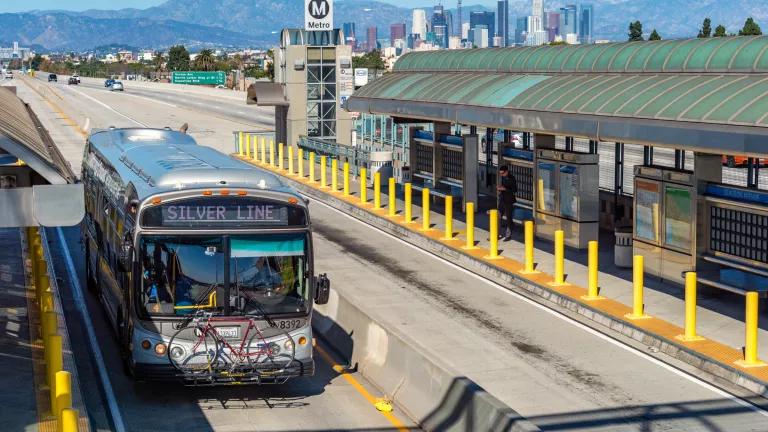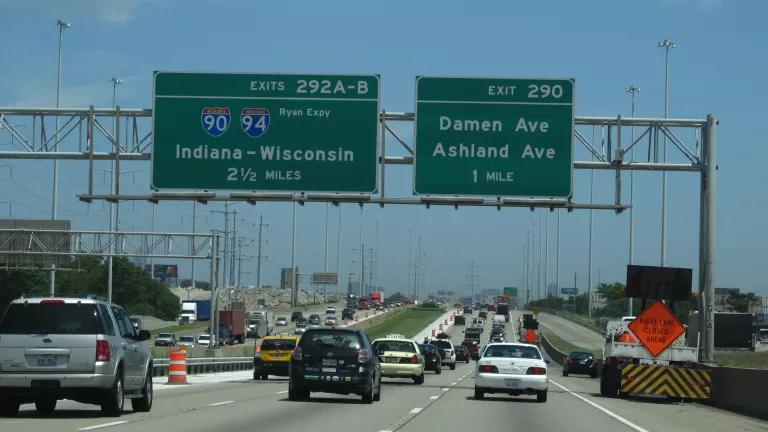Leveling the Playing Field Toward an Equitable Clean Freight Trucks Transition
Our climate and health crises are so vast and complex, we have to change the way we tackle our problems to move the needle. The Delivering Zero Emissions Communities (DZEC) clean truck accelerator program is exploring new models.
Our climate and health crises are so vast and complex, we have to change the way we tackle our problems to move the needle; otherwise, we are doing the same thing over and over and expecting different results.
The Delivering Zero Emissions Communities (DZEC) clean truck accelerator program is exploring new models. Over the past year and a half, coalitions in Chicago, San Diego, and San José, California, have been working toward reducing freight truck emissions in low-income communities of color by bringing community-based organizations (CBOs) and local agencies together to collectively tackle truck pollution. This community-first coalition model has led to mapping pollution in neighborhoods near warehouses, visiting truck stops to talk to independent drivers, and learning that a handful of trucks can constitute a majority of trips. All efforts have been helpful in identifying top targets for electrification. Centering the voices of environmental justice (EJ) groups in the work, with their lived experiences and community connections, has helped agencies to design better and more effective programs that are responsive to community needs and that provide more benefits for the community, building support and momentum for their policies. Implementing programs to improve the lives of those who are disproportionately affected by freight truck pollution has fostered better relationships between community groups and local agency staff.
In Chicago, the DZEC program helped bring city staff and community partners together around zero-emission freight goals—an achievement in a city that is working to rebuild trust with communities. In addition to mapping health impacts in the overburdened Little Village neighborhood on Chicago’s South Side, the group also conducted truck counts; explored a voluntary program to encourage fleet electrification; and discussed land use policy tools, like cumulative impact ordinances and revisions to Chicago’s sustainable development policy that can act as mechanisms to incentivize zero-emission freight trucks, especially around the siting of warehouses.
"The DZEC program has provided us an opportunity to accelerate medium- and heavy-duty vehicle electrification at the city level, which is an important step toward achieving zero-emission freight,” says José Miguel Acosta Córdova, senior transportation policy analyst for Little Village Environmental Justice Organization (LVEJO). “LVEJO represents one of the neighborhoods most impacted by freight facilities, with some of the worst air pollution in the state. This program can significantly help reduce diesel pollution in Little Village, as well as the dozens of other communities impacted by truck traffic in the city," says Acosta.
“This program has let CNT greatly build our capacity in a number of environmental justice priorities: mapping health disparities, analyzing truck traffic, and planning for air quality monitor siting, among others. It’s also given us an opportunity to dive into cutting-edge policy matters like cumulative impacts analysis and truck electrification,” says Bob Dean, chief strategy and program officer for Center for Neighborhood Technology (CNT). “CNT’s mission is to be an effective analytical partner to frontline environmental justice organizations, and the DZEC program has very much helped us advance that goal.”
“The program has provided [the city of Chicago] with a forum to exchange ideas, data, and opportunities for further collaboration while leveraging the expertise of national industry leaders such as NRDC and CALSTART,” emphasizes Samantha Bingham, clean transportation program director of Chicago’s Department of Transportation. “It has been an honor to work with CNT and LVEJO to collaborate on strategies to accelerate local zero-emission vehicle adoption mitigating the impact of transportation emissions in communities overburdened by air quality impacts.”

Chicago DZEC cohort call, spring 2023
In San Diego, the Port passed its Maritime Clean Air Strategy (MCAS) with DZEC’s support in 2021. MCAS seeks to achieve 40 percent zero-emission truck trips by 2026 and 100 percent zero-emission truck trips by 2030, five years before the anticipated state requirement. The MCAS was adopted in response to demands from surrounding EJ communities, like Barrio Logan, that are impacted by diesel pollution levels that are among the highest in the state. Children in these communities have asthma hospitalization rates that are at least three times higher than the county average. The Environmental Health Coalition (EHC) led the effort to achieve adoption of MCAS. According to Philip Gibbons, Environment & Sustainability program director at the Port of San Diego, “DZEC has been helpful for us because it has allowed us to work directly with regional stakeholders like EHC, SANDAG [San Diego Association of Governments], and the city of San Diego, as well as other communities from around the nation. Sharing best practices and lessons learned with others as we transition to zero-emission goods movement is necessary. Our biweekly meetings have offered a forum for us to communicate.”
The San Diego DZEC coalition is also focused on outreach to small fleets and individual truck owners, since these groups are most likely to need additional technical and financial support in the transition to zero-emission electric trucks and are thus at risk of being left behind. To ensure this goal is met, EHC, with support from DZEC partners, is spearheading outreach events at port marine terminals to talk directly with truckers, many of whom are not English speakers. According to Diane Takvorian, former executive director of EHC, “environmental justice requires that all people have the right to live, work, and play in a clean and safe environment. That includes truckers who depend on their trucks for their livelihood. As California makes the transition away from fossil fuel, we have to ensure that it is a just transition.”

San Diego DZEC small-fleet outreach event, winter 2023
In San José, DZEC supported the city in passing its Carbon Neutral 2030 Resolution in 2021, which goes beyond freight and encompasses all city emissions. San José has been proud to build a foundation for freight truck work through DZEC. Freight work represents a new practice and focus area for the city’s Department of Transportation, and has been developed through data analysis, community engagement, and outreach to freight industry stakeholders and truckers. The city is also working on a neighborhood, last-mile delivery pilot to test zero-emission strategies and technologies on the ground.
For Sarah Abroff, associate transportation specialist for the city of San José, “the DZEC program allowed the city of San José to start work on an important area in the field of climate change mitigation: urban freight. The funding and technical assistance has gotten us started on a community-focused program that may have otherwise never happened. With this support, we have been able to study what other cities have done in this area, analyze freight truck activity within our city, and start the planning process for a last-mile delivery pilot.”

San José DZEC community outreach event, summer 2022
After two years, the DZEC program is scheduled to come to a close in June 2023. Through hard work and participation in this program, coalitions in Chicago, San Diego and San José have shown that ambitious clean freight truck transitions are not only possible but can also meaningfully improve communities across the country. This coalition model has demonstrated that building relationships and trust among community groups and city agencies are key to improving conditions on the ground for those who need it the most.




